Related Research Articles
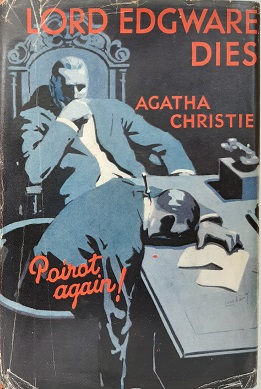
Lord Edgware Dies is a work of detective fiction by British writer Agatha Christie, published in the UK by the Collins Crime Club in September 1933 and in the US by Dodd, Mead and Company later in the same year under the title of Thirteen at Dinner. Before its book publication, the novel was serialised in six issues of The American Magazine as 13 For Dinner.

James Sidney Jones, usually credited as Sidney Jones, was an English conductor and composer, who was most famous for composing the musical scores for a series of musical comedy hits in the late Victorian and Edwardian periods. Jones's most famous musical was The Geisha, but several of his pieces were among the most popular shows of the era, enjoying long runs, international tours and revivals.
Szibill is an adaptation of the operetta Leányvásár, composed by Victor Jacobi, with a libretto by Miksa Bródy and Ferenc Martos; the original production in Hungarian premiered in Budapest in 1911. Szibill was adapted by the same librettists. First performed on February 27, 1914, at the Királyszinház in Budapest starring Sári Fedák in the title role, it rapidly made its way around Europe.

The Black Crook is a work of musical theatre first produced in New York City with great success in 1866. Many theatre writers have cautiously identified The Black Crook as the first popular piece that conforms to the modern notion of a musical. The book is by Charles M. Barras. The music, selected and arranged by Thomas Baker, consists mostly of adaptations, but it included some new songs composed for the piece, notably "You Naughty, Naughty Men". The story is a Faustian melodramatic romantic comedy, but the production became famous for its spectacular special effects and skimpy costumes.
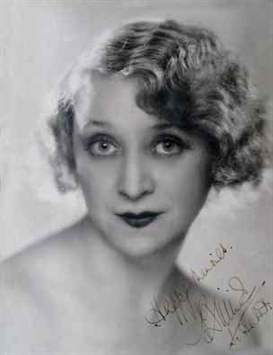
Beatrice "Binnie" Mary Hale-Monro was an English actress, singer and dancer. She was one of the most successful musical theatre stars in London in the 1920s and 1930s, able to sing leading roles in operetta as well as musicals, and she was popular as a principal boy in pantomime. Her best-remembered roles were in the musicals No, No, Nanette (1925) and Mr. Cinders (1929), in which she sang "Spread a Little Happiness".
Vivian John Herman Ellis, CBE was an English musical comedy composer best known for the song "Spread a Little Happiness" and the theme "Coronation Scot".
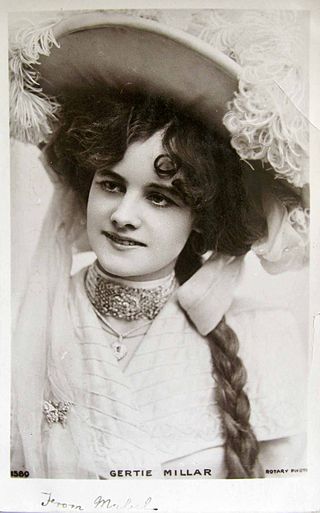
Gertrude Ward, Countess of Dudley, known as Gertie Millar, was an English actress and singer of the early 20th century, known for her performances in Edwardian musical comedies.

The Orchid is an Edwardian musical comedy in two acts with music by Ivan Caryll and Lionel Monckton, a book by James T. Tanner, lyrics by Adrian Ross and Percy Greenbank, and additional numbers by Paul Rubens. The story concerns marital mix-ups and the quest of a wealthy man for a $2,000 Peruvian orchid to be sent to France. When foul play keeps the flower from reaching its destination, it is discovered that a nearly identical orchid is growing in the garden of the horticultural college.
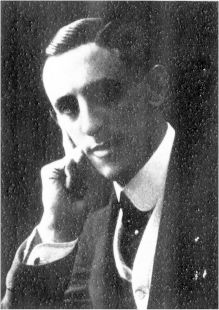
Paul Alfred Rubens was an English songwriter and librettist who wrote some of the most popular Edwardian musical comedies of the early twentieth century. He contributed to the success of dozens of musicals.

Les p'tites Michu is an opérette in three acts, with music by André Messager and words by Albert Vanloo and Georges Duval. The piece is set in Paris in the years following the French Revolution and depicts the complications ensuing after the identities of two girls become confused in their infancy.
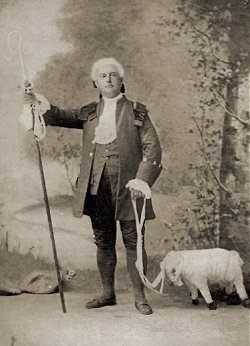
Happy Arcadia is a musical entertainment with a libretto by W. S. Gilbert and music originally by Frederic Clay that premiered on 28 October 1872 at the Royal Gallery of Illustration. It was one of four collaborations between Gilbert and Clay between 1869 and 1876. The music is lost. The piece is a satire on the genre of pastoral plays in which the characters, who each wish that they could be someone else, have their wish granted, with unhappy results.

La fille du tambour-major is an opéra comique in three acts, with music by Jacques Offenbach and words by Alfred Duru and Henri Chivot. It was one of the composer's last works, premiered less than a year before his death. It opened at the Théâtre des Folies-Dramatiques, Paris, on 13 December 1879, and, after a successful initial run, was frequently revived in Paris and internationally, but in recent times has not been among the Offenbach operas most frequently staged.

La fille de Madame Angot is an opéra comique in three acts by Charles Lecocq with words by Clairville, Paul Siraudin and Victor Koning. It was premiered in Brussels in December 1872 and soon became a success in Paris, London, New York and across continental Europe. Along with Robert Planquette's Les cloches de Corneville, La fille de Madame Angot was the most successful work of the French-language musical theatre in the last three decades of the 19th century, and outperformed other noted international hits such as H.M.S. Pinafore and Die Fledermaus.

Dance, Little Lady is a 1954 British drama film directed by Val Guest and starring Terence Morgan, Mai Zetterling, Guy Rolfe and Mandy Miller. The film was made by independent producer George Minter and distributed by his Renown Pictures. It was shot in Eastmancolor at the Walton Studios near London. The film's sets were designed by the art director Frederick Pusey.
Spread a Little Happiness" is a song by the musical comedy composer Vivian Ellis and writer Clifford Grey from their 1929 West End musical Mr. Cinders. In the original production it was sung by Binnie Hale as the character Jill Kemp; a recording of her performance of the song was released by Columbia in 1929.
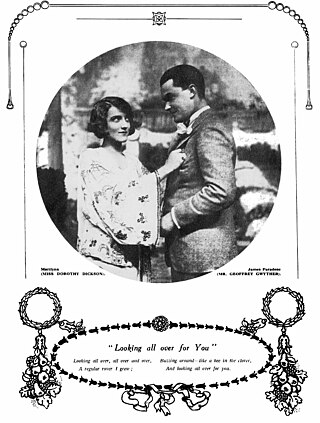
The Cabaret Girl is a musical comedy in three acts with music by Jerome Kern and book and lyrics by George Grossmith, Jr. and P. G. Wodehouse. It was produced by Grossmith and J. A. E. Malone at the Winter Garden Theatre in London's West End in September 1922 and featured Dorothy Dickson, Grossmith, Geoffrey Gwyther, and Norman Griffin in the leading roles.
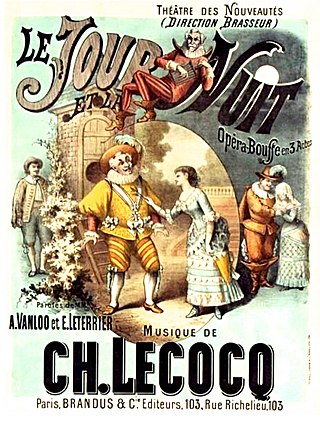
Le jour et la nuit is an opéra-bouffe with a libretto by Albert Vanloo and Eugène Leterrier and music by Charles Lecocq. It was first performed in Paris in 1881, ran for 193 performances and was subsequently staged at other theatres in Europe, North America and Australia. It has not remained in the regular international operatic repertoire.
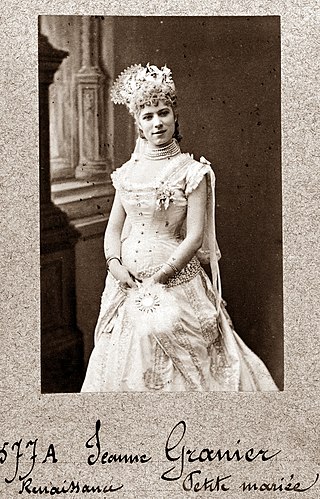
Le petite mariée is a three-act opéra-bouffe, with music by Charles Lecocq and libretto by Eugène Leterrier and Albert Vanloo. It was first performed at the Théâtre de la Renaissance, Paris on 21 December 1875. The opera, set in 16th-century Italy, depicts the farcical complications after the hero is caught in flagrante with the local grandee's wife.

Les cent vierges is an opérette in three acts, with music by Charles Lecocq and a libretto by Clairville, Henri Chivot and Alfred Duru. It was first produced at the Théâtre des Fantaisies-Parisiennes, Brussels, on 16 March 1872. The plot concerns the British government's efforts to ship brides out to a distant colony for the all-male colonists. Two French women are accidentally on board the ship taking the brides out, and are pursued to the island by their husbands. The four French intruders are threatened by the colonial governor, but after plotting and farcical goings-on, all ends satisfactorily.
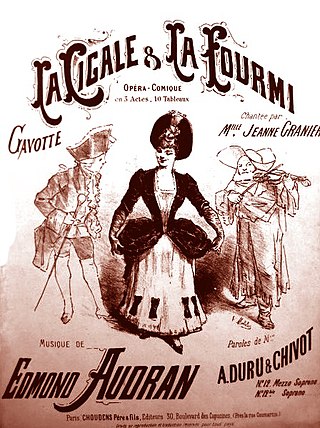
La cigale et la fourmi is a three-act opéra comique, with music by Edmond Audran and words by Henri Chivot and Alfred Duru. Loosely based on Jean de La Fontaine's version of Aesop's fable The Ant and the Grasshopper, the opera shows the lives of two young women, one prudent, like the ant, the other improvident and reckless, like the grasshopper. Unlike the Aesop fable this version has a happy ending, with the "ant" looking after the destitute "grasshopper".
References
- ↑ Mr. Cinders, BroadwayWorld
- ↑ Gänzl, p. 295
- ↑ Mr Cinders" Faber Music. Retrieved 26 October 2018
- ↑ Gänzl and Lamb, pp. 130–131
- ↑ "Mr. Cinders". The Sydney Morning Herald . No. 28, 862. New South Wales, Australia. 7 July 1930. p. 6. Retrieved 23 February 2019– via National Library of Australia.
- 1 2 3 4 Gänzl and Lamb, p. 128
- ↑ Gänzl and Lamb, pp. 131–132
- ↑ "Adelphi Theatre", The Times, 12 February 1929, pg. 12
- ↑ Gordon and Jubin, p. 179
- ↑ Gänzl and Lamb, p. 132
- ↑ "Mr Cinders", World Cat. Retrieved 26 October 2018
- ↑ "Mr Cinders", World Cat. Retrieved 26 October 2018
- ↑ "Mr Cinders", World Cat. Retrieved 26 October 2018
- ↑ Holden, Stephen. "An Old Tale, With a Spin On the Sexes", The New York Times, 18 November 1988
- ↑ "History", Shaw Festival. Retrieved 26 October 2018
- ↑ "Mister Cinders", British Film Institute. Retrieved 26 October 2018